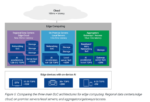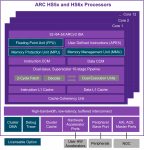The ARC Processor has a rich history. Originally named the Argonaut RISC Processor, it was designed for the Nintendo Game Systems in the 1990s. Argonaut Technologies Limited later became ARC International. My first intimate exposure to ARC was in 2009 when Virage Logic acquired ARC. A year later Virage was acquired by Synopsys… Read More
Synopsys Webinar: A Comprehensive Overview of High-Speed Data Center Communications
High-speed communication is a critical component for many applications, most notably in the data center. The serializer/deserializer physical interface, or SerDes PHY is the backbone of many different forms of high-speed communication for this application. Use cases include on chip, between chips, between boards and racks… Read More
Accelerating High-Performance Computing SoC Designs with Synopsys IP
Semiconductor IP is one of the most talked about topics on SemiWiki. Always has been, always will be. Synopsys is also one of the most talked about topics on SemiWiki and IP is a very big part of that, absolutely.
After reading Eric Esteve’s latest IP Report I Googled around and found some interesting things. First, I found a Brief History… Read More
Quantifying the Benefits of AI in Edge Computing
Many of us are now somewhat fluent in IoT-speak, though at times I have to wonder if I’m really up on the latest terminology. Between edge and extreme edge, fog and cloud, not to mention emerging hierarchies in radio access networks – how this all plays out is going to be an interesting game to watch. Ron Lowman, DesignWare IP Product… Read More
Synopsys Introduces Industry’s First Complete USB4 IP Solution
Synopsys announced an addition to its popular DesignWare IP portfolio recently that has some significant ramifications. The company announced the industry’s first complete USB4 IP solution. Before we get into the details of the announcement, let’s take a quick look at the USB standard and why it’s important.
Standards… Read More
Synopsys – Turbocharging the TCAM Portfolio with eSilicon
About 90 days ago, Synopsys completed the acquisition of certain IP assets from eSilicon. The remaining entirety of eSilicon was acquired by Inphi Corporation. I was the VP of marketing at eSilicon during that acquisition so it’s very interesting to me to find out how things are going with those certain IP assets. I got an opportunity… Read More
Synopsys is Changing the Game with Next Generation 64-Bit Embedded Processor IP
Synopsys issued a press release this morning that has some important news – Synopsys Introduces New 64-bit ARC Processor IP Delivering Up to 3x Performance Increase for High-End Embedded Applications. At first glance, one could assume this is just an announcement for some new additions to the popular ARC processor family. While… Read More
Security in I/O Interconnects
I got a chance to chat with Richard Solomon at Synopsys recently about a very real threat for all of us and what Synopsys is doing about it. No, the topic isn’t the Coronavirus, it’s one that has been around a lot longer and will continue to be a very real threat – data and interconnect security.
First, a bit about Richard. He is the technical… Read More
IP to SoC Flow Critical for ISO 26262
In thinking about automotive electronics safety standards, such as ISO 26262, it is easy to jump to the conclusion that they are in reference to systems such as autonomous driving, which are entering the marketplace. In reality, functional safety in automotive electronics plays a significant role in many well-established automotive… Read More
New ARC VPX DSP IP provides parallel processing punch
The transition to the digital age from a mostly analog world really began with the invention of the A-to-D and D-to-A converters. However scalar processors can easily be overwhelmed by the copious data produced by something as simple as an audio stream. To solve this problem and to really jumpstart the digital age, the development… Read More










